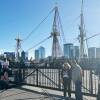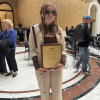More than 2,000 miles away from Cuba, the announcement this week that the United States is restoring diplomatic relations with the island nation is resonating in a historical way here in Boston.
Housed on a windy point in Dorchester is a treasure trove of information about history’s most tense moment between the United States and Cuba. There’s an exhibit at the John F. Kennedy Library and Museum called “To the Brink: JFK and the Cuban Missile Crisis.”
As visitors open the doors to the exhibit, they’re greeted with a video of President Kennedy, solemnly addressing the nation as the crisis unfolded.
"In closing the speech, he wanted to address directly the people of Cuba," said Stacy Bredhoff, the exhibit’s curator. "And even in this very scary, dark moment of history when the world was nearly plunged into a nuclear war, he says to the Cuban people, 'I have no doubt that most Cubans today look forward to the time when they will be truly free.'"
"Free from foreign domination," Kennedy continued in his speech. "Free to choose their own leaders. Free to select their own system, free to own their own land. Free to speak and write and worship without fear or degradation."
“I’m Cuban from my head to my toe," said Liuva Del Toro.
It’s been more than 50 years since the missile crisis, but Cubans like Del Toro are still waiting for the freedom Kennedy spoke about. But Del Toro, who lives in Jamaica Plain, sees an opening in this week’s announcement of a break in the cold relationship between the two nations.
“When you want to go to somebody’s house, you have to open the door," he said. "But before you open the door, you have to knock."
He’s optimistic. And Del Toro’s no friend of the Castro regime.
“I was 16 years in jail in Cuba as a political prisoner,” he said.
Del Toro says he was thrown in prison for working against the system.
“As a matter of fact, I tried to kill Fidel Castro,” he said.
Del Toro says he put a bomb under a bridge, hoping to target the dictator, but Castro never wound up going there. Del Toro describes prison as hell. Sitting at a table at the Old Havana Cuban Restaurant in JP, he pulls up his pants leg and points to a scar.
“You see that? That is a bayonet,” he said.
Del Toro was released from prison in 1980 as part of a deal struck by the United States. Despite the fact he says he tried to kill Castro, he says he doesn’t hate him.
“I did because I want freedom," he said. "And this freedom, you have to work for that."
And now that Castro’s brother, Raul, is in charge of the country, Del Toro says he’s been expecting an announcement like the one this week, which eased restrictions on travel and banking, and exchanged some prisoners, "because the Cuban government is trying to change something over there, with Raul Castro."
Del Toro rejects the criticism that some Cubans in the U.S. have been offering, that economic sanctions are necessary to punish the Cuban regime.
“The best way to punish somebody is when you negotiate with that person and let him know what he’s doing is no good,” he said.
Del Toro says he still doesn’t trust Raul Castro, but he thinks Castro knows the current system doesn’t work.
Del Toro says as a former political prisoner, he hasn’t been able to go back to his home country since he left in 1980. He says he hopes he can soon go back home.




